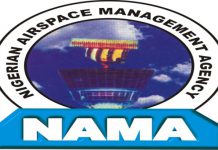The Nigerian Civil Aviation Authority (NCAA) has begun a probe into the supply of toxic fuel to airlines with the view to stopping a recurrence.
The investigation followed a recent safety breach wherein water was found in the fuel tank of a Boeing 737 aircraft operated by Max Air.
The director general of NCAA, Capt, Musa Nuhu disclosed this at a meeting with the domestic and international airline operators, aviation fuel suppliers, and the Nigerian Midstream and Downstream Petroleum Regulatory Authority (NMDPRA) held yesterday in Abuja.
Nuhu also said there was an ongoing wide consultation with all the relevant stakeholders to identify the gaps, close them, prevent future occurrence, and improve safety in the industry.
He said fuel contamination is outside the purview of the aviation ecosystem, hence the decision to engage the regulator of the downstream sector.
“We have been in consultation with NMDPRA because they certify all the oil companies in Nigeria,” he said.
Based on the sensitivity of the matter he said the collaboration became imperative because of the noticed gaps caused by lack of deliberate collaboration between NCAA, NMDPRA, and the Federal Airports Authority of Nigeria (FAAN) on fuel quality monitoring.
He further noted that the NCAA, FAAN, NMDPRA, Nigerian Safety Investigation Bureau (NSIB), airlines, pilots, fuel deport operators, aircraft maintenance officers and other stakeholders will be part of a committee that will be set up to ensure that aviation fuel quality is constant.
“All facets of the aviation fuel ecosystem must be investigated to arrive at the true situation. The investigation is not necessarily to indict anyone but to strengthen safety in the aviation industry,” he added.
Nuhu said aviation fuel quality breach has dire consequences and is multifaceted, international in nature, and not limited to scheduled airlines alone.
In his remarks, the chief executive officer of the NMDPRA, Mr Farouk Ahmed said the Authority had already begun an investigation into the matter.
“We are all stakeholders and travelers. We took this incident seriously. I directed my colleagues to trace the root cause so that whatever steps we will take, will bring stability, confidence and improve the safety level,” he said.
He said while he could vouch for the quality of the Jet A1 fuel that was imported, he could not account for what happened when the fuel left the fuel depot to the fuel bowsers before it is discharged into an aircraft.
He said he looked forward to more collaboration with NCAA, FAAN, and other relevant stakeholders to close the gaps that led to the incidence of adulterated fuel.
For his part, the director general of NSIB, Mr Akin Olateru said the issue was grave and must be thoroughly investigated.
He noted that NSIB had in 2017 issued safety recommendations as it concerns aviation fuel following an incident involving Bel 427 of the Nigerian Police at the time.
He said the safety recommendation advised the NCAA to launch an independent investigation into aviation fuel quality in Nigeria while also focusing on vulnerability and risks in the fuel distribution process.
He therefore charged the NCAA to step up action, oversight the aviation fuel and ensure it is of top quality.
The participants agreed that the NCAA needs to develop safety guidelines on aviation fuel and publish this for the airlines to implement.
Other participants at the meeting held both physically and virtually included representatives of International Civil Aviation Organisation (ICAO), ICAO Western and Central African (WACAF) Office, Banjul Accord Group Safety Oversight Organisation (BAGASOO), International Airlines Association (IATA), Nigerian College of Aviation Technology (NCAT), airline operators, oil marketers, etc.























































